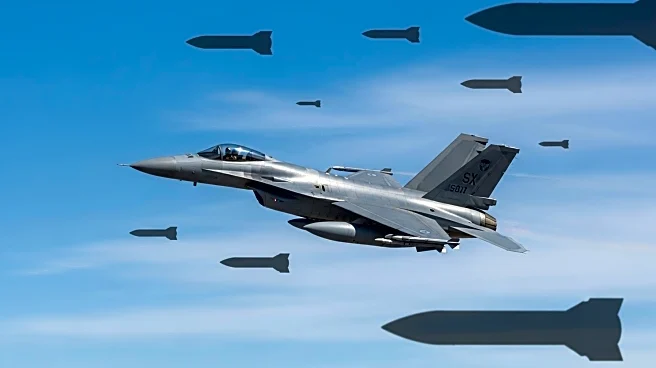What's Happening?
Israel has conducted airstrikes targeting Houthi sites in Yemen, including an abandoned presidential palace and power stations, following missile and drone attacks by the Houthis. Despite these strikes, the Houthis remain undeterred, continuing to pose a significant threat to Israel. The Houthis have been firing missiles and drones at Israel since the onset of the conflict, with their spokesman, Yahya Saree, claiming responsibility for various attacks, including a recent missile launch at Ben Gurion Airport. The missile, equipped with a cluster warhead, marked a dangerous escalation in the conflict. Israel's response has been criticized for targeting sites with little strategic value, prompting calls for a more decisive approach to disrupt the Houthi leadership and infrastructure.
Why It's Important?
The ongoing conflict between Israel and the Houthis highlights the persistent threat posed by the Iran-backed rebel group. The Houthis' ability to launch advanced weaponry, such as missiles with cluster warheads, underscores the need for Israel to reassess its strategy. The situation has broader implications for regional stability, as the Houthis' actions could further escalate tensions in the Middle East. Israel's current approach, focusing on symbolic strikes, may not be sufficient to deter the Houthis, potentially leading to increased military engagements and affecting diplomatic relations in the region.
What's Next?
Israel may need to consider a shift in strategy, focusing on targeting the Houthi leadership and infrastructure to effectively neutralize the threat. This could involve more precise and impactful military operations aimed at disrupting the group's capabilities. Additionally, Israel might seek to strengthen alliances with regional partners to address the Houthi threat collectively. The international community, including the United States, may also play a role in mediating and supporting efforts to stabilize the region.
Beyond the Headlines
The conflict with the Houthis raises ethical and legal questions regarding the use of advanced weaponry and the targeting of civilian infrastructure. The Houthis' actions, driven by political motives, reflect broader geopolitical dynamics involving Iran's influence in the region. Long-term implications could include shifts in military strategies and alliances, as countries reassess their approaches to dealing with non-state actors and proxy conflicts.










